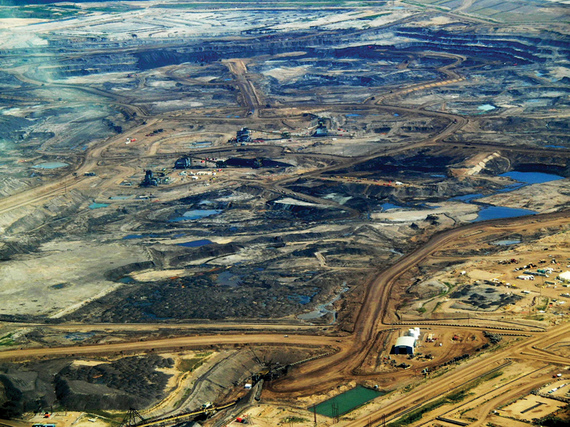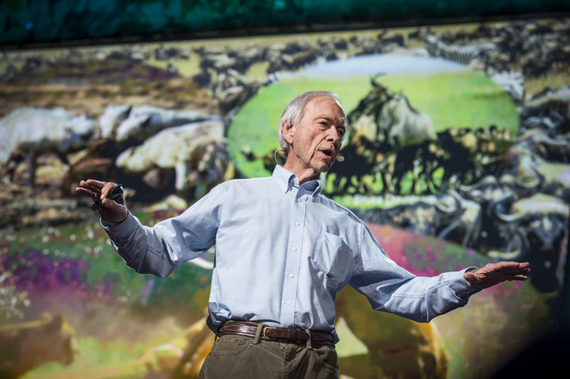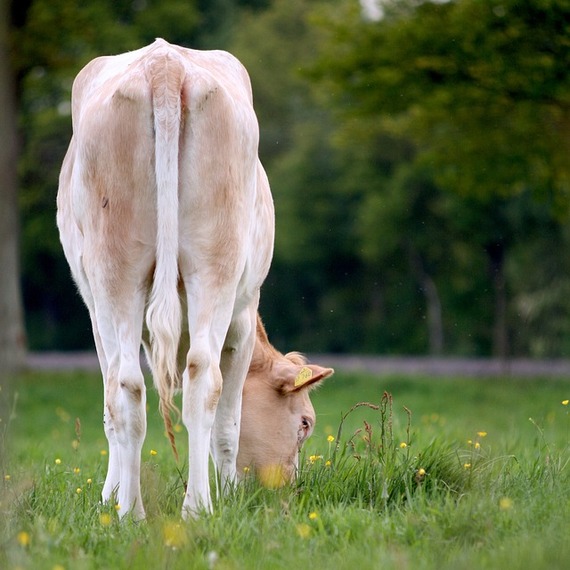Picture Source: chefranden and Animal Photos! (Moo, am I right?)
Cows, eh? Well, first let's begin with the underbelly that leads to this cattle conclusion. There is of course an exchange between our culture and our habits of thought. On the personal end of the spectrum, we could agree that more often than not, we ground our understanding of the world through a linear narrative. Consider how you might reason yourself into purchasing a new and superfluous commodity. Or how policy leads to a teaching-to-the-test model for education.
Scores evidence learning -> better test scores = more learning? Could there be any other dynamics? Political jargon is tragically laced with simplified, easily
understood arguments, contorting legitimate issues into sound-bite statements and provocative online news titles. (Supercows? ... more at 11:00)
By here we arrive at the predicament on the global end of the spectrum. The environment is poised for collapse and despite scientific consensus, we find the issues postured in terms of belief. Certainly, the concerns are manifold and our need to construct convincing explanations in understandable terms creates durable challenges. But what causes this proclivity for the quick (and dirty) answer and its cultural profusion?
Efficiency, the mad-dash for resources and capital leverage overwhelmingly incentivizes individuals towards an ends-justify-the-means mindset. Unfortunately, understanding is not a quality coincident with efficiency. This article evinces one problem efficiency causes, what Noam Chomsky famously described as media's desire for concision. It's impossible to address every issue at hand in fewer than a thousand words. And nothing is immune from a global framework whose economy only functions with increasing growth. This incidentally, is another example of simplified expectation manifesting in our systems. There are damning consequences. Capital markets need products, and those products need resources that are rapidly diminishing and degrading. Turns out it's daunting to feed 7 billion people, soon to be 9, in the face of global ecological collapse.
An economist isn't needed to convince anyone that scarcity generates supply and demand, or that conflict, desertification and poverty are its products. Surface arguments calling for global vegetarianism or solar panels on every roof largely dismiss or marginalize social and environmental complexity. Concurrently, since most intricacies inhibit efficiency, the trend of our institutions is to bulldoze a direct course through whatever convolutions arise. Frequently, using real bulldozers -- reference rainforest deforestation, tar sands or mountain top removal mining.
Needed is an approach that circumvents our seemingly inexhaustible taste for simple answers and can assess the multifaceted relationships that exist between our thinking, our environment, and our cultural constructions.
This need leads us back to the cows and the one model that most aptly addresses the aforementioned issues in addition to preparing for those we have yet to encounter. Like many, I was impressed by the TED talk presented by the Zimbabwean biologist, Allan Savory, co-founder of the Savory Institute, that suggest that with cattle we find the lynchpin to resolving our most pressing global issues. I was more impressed by the detailed lecture given at Harvard.
(Allan Savory presenting at TED)(Image courtesy of Savory Institute.)
With Savory, we get many radical claims, that our precarious environmental situation has roots in ancient land management and is only exacerbated by recent technological advents, and that no institution using conventional methods will be able to reverse the degradation. Effectively, that the causes of these issues reside in our approach to addressing problems -- a glitch in the human algorithm. That contemporary agriculture is the most destructive of industries and is more responsible for climate change than Sean Hannity's SUV. And key for Savory, that within a holistic framework, deliberate and sensitive use of cattle will not only prevent, but reverse the damage already done.
Pull the other one you say?
Ruminates (cows, wildebeest etc.) and grasses have co-evolved for 55 million years, creating a mutually dependent ecology that long dominated 40 percent of the Earth's terrestrial footprint. Savory suggests that the disruption of this balance is the underlying cause of our most pointed global issues. Consequently, self-aware, questioning, and proactive reestablishment of the grassland ecosystem is the key to resolving them.
The hinge is that ecologically active grassland removes CO2 from the atmosphere and stores it in the biology of the soil. In addition, when we use cattle to reestablish grassland, jobs, food and soil are byproducts. With this, the problem of scarcity dawns a new countenance. ( Extended explanation)
In matter of fact, though there is much ballyhoo about the cattle, it is the richness of Savory's insightful methodology that truly shines. Likely, no single vision exists to solve the myriad issues that confront us, but Savory's claim to address environmental degradation on two-thirds of the Earth's most damaged landmass, is achingly full of promise. The need for action is desperate. We are at the end of our experiment with hyper-efficient finance capital systems -- we have to be. There is no commodity that can cover our debts when the planet's tax collector comes a 'knocking. The Earth is our looking glass -- across the entirety of every spectrum. As implied in Savory's model, we need to be open for what persistently eludes our scope: our philosophical and conceptual finitude. Somewhere, our biology may incline us towards oversimplified logic, and it's possible this amounts to doom-speak and perspectives will unfold regardless. So far though, we've consistently found a way to overcome the apathetic shrug.
Still the stakes shift. Will we reach the popular threshold required for change? Will we cause the tipping point in time?


